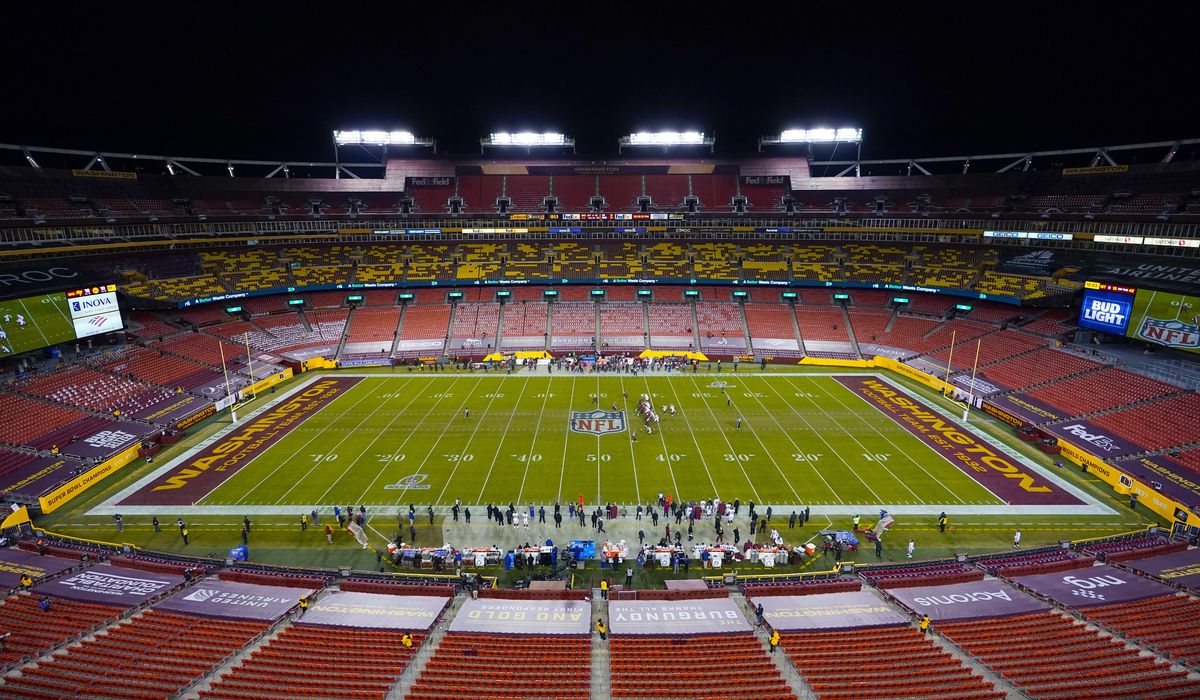
Washington’s rebrand faces an obstacle as the team’s trademark application for the “Washington Football Team” was refused — creating long-term questions about whether the NFL franchise can stick with the plain-vanilla name the franchise adopted prior to the 2020 season.
The U.S. Patent and Trademark Office ruled Friday that the “Washington Football Team” is too generic and too similar to an existing trademark held by Martin McCaulay — a Virginia man who holds the registration to “Washington Football Club.”
Washington has six months to respond to the ruling, which can be appealed. Last year, the team abandoned its longtime moniker of “Redskins” on July 13 and rebranded as the “Washington Football Team” 10 days later. The team filed a trademark application for the name on July 29.
At first, team officials sold the new name as a placeholder while the franchise explored fully rebranding. But as last season unfolded — and the Burgundy-and-Gold started to have success under the moniker — owner Dan Snyder and team president Jason Wright both suggested that the name could stick if that’s what resonates with fans. “If the Washington Football Team name catches on … we would be happy to have it as our permanent name,” Snyder wrote in an email to the Wall Street Journal last fall.
As Washington’s rebranding process drags on, the team plans to keep the generic “Washington Football Team” for another season.
Wright has said he expects the search to last at least another year and the team won’t unveil a new look until it has all its affairs in order — meaning the organization has secured a trademark, designed a new logo, created merchandise and taken care of all the other little details that come with rebranding.
Friday’s decision, meanwhile, complicated efforts for the team to secure the trademark for its placeholder. The team’s trademark sought to protect apparel such as clothing, hats, t-shirts, sweaters, pants and other commercial goods.
The trademark office determined that “consumers would be confused, mistaken or deceived” due to the similar nature of McCaulay’s trademark.
“Both marks begin with the wording WASHINGTON FOOTBALL,” the office wrote. “The two marks are virtually identical in sound, appearance and meaning. The only difference between the two marks is the wording that follows the identical portions and the stylization added to the wording in applicant’s mark. These similarities create the same commercial impression in the minds of consumers.”
The office also ruled the team’s name was too generic for trademark purposes because it is “primarily geographically descriptive,” meaning it leans too heavily on the team’s location.
American University law professor and lawyer Victoria Phillips said in an email she anticipates Washington to challenge the ruling quickly, writing that “going without federal trademark protection for these goods seems very unlikely. Without a trademark, others would be allowed to sell Washington Football Team apparel — and the franchise would have a harder time stopping it, she said.
Washington could always look to challenge McCaulay’s registration or buy out his use of it. According to trademark office records, McCaulay first requested a trademark for “Washington Football Club” in November 2014 — and it was granted in May 2015. The trademark is for “athletic shirts, sports caps and hats.”
McCaulay, who is from Alexandria, started filing trademarks in 2014 in anticipation that one day Washington would have to change the old nickname that had increasingly come to be seen as racially insensitive.
McCaulay has filed more than 45 applications, with most considered “live” — which means granted, suspended or under review.
Last July, McCaulay told The Washington Times that he was “very excited” to see Washington undergoing a name change.
“My trademarks have been in use for five years,” he said. “If the Redskins now want to be a trademark bully and want to get my trademarks canceled, I’m not sure what their standing is. … Mine are different because I actually use them all.”
McCaulay’s lawyer, Darren Heitner, told The Washington Post that McCaulay is “willing to discuss assigning his valuable registration” with the team.
Phillips suggested it would be easier for Washington to settle with McCaulay rather than take him to court.
“In response, they could try to invalidate (or) cancel McCaulay’s marks by claiming he obtained it fraudulently and never had a legitimate intention to sell goods under the names,” Phillips wrote. “But proving this intent is really hard and fraud on the (trademark office) rarely succeeds—but the team could try to make that claim given all his related applications and limited actual activities under the marks.”
Phillips added the team could likely overcome the geographical concerns by the team “showing that the new name has already become well known and associated with the team in the market.”




